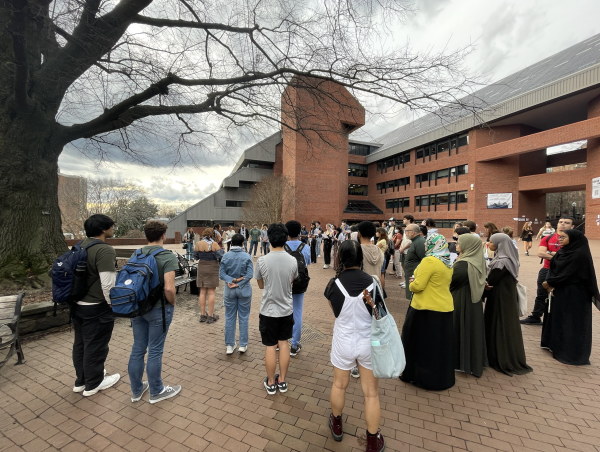Over 100 Georgetown University students and workers attended vigils Jan. 26 as part of a day of solidarity to commemorate those killed in Gaza.
Georgetown University Medical Students for Palestine (GUMS4Palestine), a group of Georgetown healthcare students who support Palestinian liberation, held a vigil at the Medical-Dental Building to remember healthcare workers killed in Gaza by reading their names and biographies. Later that day, the Georgetown chapters of Students for Justice in Palestine (SJP), a pro-Palestinian college student organization; Jewish Voices for Peace (JVP), an anti-Zionist Jewish college student organization; and Zeytoun, an organization dedicated to decolonization in the Middle East and Northern Africa, congregated in Red Square, reading the names of college-aged students killed in the conflict.
Hamas killed 1,200 Israelis in its Oct. 7 attack and captured around 250 hostages, half of whom remain in captivity. The Israeli response, which had lasted 112 days at the time of the vigils, has killed more than 26,000 Palestinians in Gaza, along with numerous United Nations workers, journalists and over 400 healthcare workers.
Akanksha Sinha (SFS ’23), a current staff member at The Earth Commons and the Center for Social Justice Research, Teaching and Service (CSJ) and a member of Zeytoun and Faculty and Staff for Justice in Palestine (FSJP), said the day of solidarity drew inspiration from Palestinian journalist Bisan Owda, who called for a global strike between Jan. 21 and Jan. 28 following Israeli forces’ violence near Nasser Hospital in Gaza, which forced many displaced civilians to evacuate the sanctuary of the hospital. Sinha said the global strike included attending vigils and boycotting companies that stopped employees from expressing support for Palestine.

“Our Georgetown community who stand in solidarity with Palestine began mobilizing as well,” Sinha wrote to The Hoya. “The ‘day of solidarity’ idea was meant to give students, staff, and faculty across Georgetown a concrete, organized chance to divest with their time and attention on one day by partaking in various solidarity actions.”
Michael Ezeana (MED ’24), who helped organize the medical campus vigil, said the goal of the vigil was to remember the stories of health workers killed in Gaza, with Ezeana adding that sharing the stories of the health workers adheres to Georgetown’s Jesuit value of cura personalis, or promoting all aspects of human dignity.
“We thought it was really important as people guided by cura personalis, faith, to highlight the historical context in which these doctors, physicians and nurses have been killed in Gaza,” Ezeana told The Hoya. “And so we’re hoping that we can continue to highlight their work and for there to be one day a free Palestine.”
Selina Al-Shihabi (SFS ’26), who read a portion of the names at the SJP vigil, said speakers at the vigil only read 23% of the names of Gazans who were killed in the conflict, which took over two hours. Al-Shihabi said keeping compassion is important because of the high death toll.
“I thank you for still being able to feel compassion after 100 days of war, and I wish I didn’t have to say that,” Al-Shihabi said at the vigil. “But today it seems to be something rare.”
Iman Saymeh, the resident minister for the LXR (Loyola, Xavier and Ryder) and Nevils dorms, said she was proud to see students organize the day of solidarity and stand up for causes they believe in.
“As I was looking around the circle during the vigil, I saw a display of diversity, love for humanity, agents of justice, and young adults coming together to raise awareness,” Saymeh wrote to The Hoya. “I am motivated when I see our students organizing opportunities for their classmates and global causes to be seen and heard through the lens of social justice.”
Saymeh also said she spoke during the open mic portion of the vigil to commend the student organizations for leading the vigils and to urge them to continue their activism to further conversations about Gaza on campus.
“I wanted to encourage them to continue raising awareness and use their leadership roles to deepen the discussions and conversations on campus,” Saymeh wrote. “May God protect all our students and allow them to stand in unity and solidarity for the oppressed, needy, and underprivileged population wherever they are.”
Similarly, Sinha said they hope more members of the Georgetown community become involved in advocating for Gaza and the Palestinians during the conflict.
“I hope that more members of our community begin mobilizing and joining sincere efforts towards justice, liberation, and lasting peace,” Sinha wrote.
Besides the vigils, the student organizations added the Teach the Speech event to the day of solidarity events, which Georgetown holds every year for students and faculty to reflect on a speech by Martin Luther King Jr., as part of the day of solidarity. This year, the selected speech was “Eulogy for the Four Little Girls,” as the event marked 60 years since the bombing of the 16th Street Baptist Church in Birmingham, Ala. by the Klu Klux Klan.
Sinha said the vigils commemorating those killed in Gaza and King’s speech share a theme of bringing attention to and fighting against injustices rooted in colonialism.
“Black, Palestinian, and global anti-colonial solidarity holds deep, old ties, because our struggles for liberation have always been intertwined, and the systems of oppression we fight are the same,” Sinha wrote.
“It is hard to ignore the somber reflection of Birmingham’s tragedy in Palestine today when numerous churches, mosques, schools, libraries, hospitals, homes, and other civic infrastructure have been bombed by Israel,” Sinha added.
Saymeh said the reading of names of the college-aged students killed in Gaza deeply impacted her and invoked a personal sense of loss.
“As they were reading the names, I was connected with their lost dreams, opportunities, and light in this world,” Saymeh wrote.








